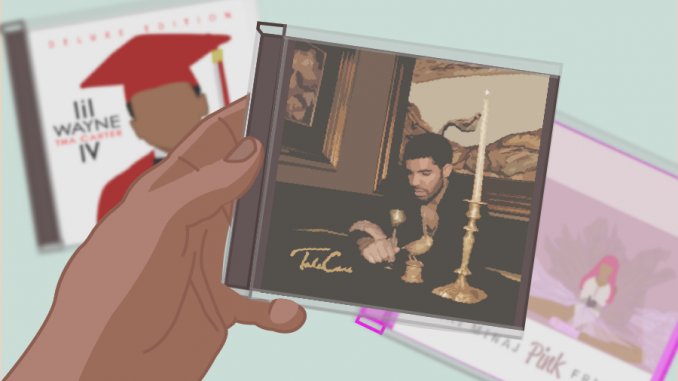
On a chilly November afternoon, my mom picked me up from school with a smile on her face and a plastic Kmart bag in hand.
Before I could even ask, she told me she’d bought a copy of Drake’s sophomore album “Take Care” on the day it was released for my dad. He loved rap music, and Drake’s music up until that point was a staple in our household, so Drake’s second album would’ve made an excellent, impromptu present.
Except things don’t go as planned for my mom. When my dad got home from work and she excitedly brought him the unexpected gift, he pulled out a plastic bag of his own, with a CD still enclosed in its packing — they had both bought each other the same album as a surprise.
From that day, Drake’s “Take Care” stayed in both of my parents’ cars, adding to the pantheon of hip-hop and R&B that I’d be raised on.
Growing up, I fell in love with booming 808s and synthetic hi hats, with hip-hop and R&B playing at all times of the day. By middle school, my rap repertoire was growing every day, thanks to my parents’ car stereos, which provided the soundtrack to my adolescence.
In my dad’s jet black sedan, the aux cord was almost always set to East Coast hip-hop: Nas, Mobb Deep and the Wu-Tang Clan regularly accompanied long, Saturday morning car rides, where we spoke little and let the aggressive lyricism fill the air. The two albums he’d play the most were Lil Wayne’s “Tha Carter IV” and Nicki Minaj’s “Pink Friday,” both of which are now some of my all-time favorites.
My mom’s light blue SUV, on the other hand, was home to the softer, more lush sounds of R&B, with names like Usher, Ne-Yo, Alicia Keys and Mariah Carey ingrained in my mind earlier than I can remember.
I grew to appreciate both genres in different ways — rap had this visceral energy to it which, combined with political lyrics that sparked my intellectual curiosity, felt exhilarating, almost entrancing; while R&B could tap into emotions I didn’t know I was capable of feeling as a kid still navigating middle school.
Then, “Take Care” entered the picture.
Drake’s sophomore album felt unique in that it combined the lush soundscapes and emotional core of R&B with the aggressive rapping and pulsating percussion of hip-hop and created a hybrid of the two genres I’d grown up with.
The album oscillates between the introspective melodrama of songs like “Shot For Me” and “Marvin’s Room” and the boastful braggadocio of tracks like “We’ll Be Fine” and “Under Ground Kings.” Other songs, like “Headlines” and the titular “Take Care,” combine rapping with singing to create something wholly new.
Rarely was I drawn to what Drake was actually saying — as a sheltered middle school kid, I couldn’t exactly relate to Drake’s salacious stories of strip clubs and sexual conquests. At that age, I didn’t know what half of the lyrics on “Marvin’s Room” meant.
Instead, it was the album’s production and sound that hypnotized me: I loved the thunderous gospel choir on “Lord Knows,” the booming percussion line on “Make Me Proud” and the harmonica solo at the end of “Doing It Wrong.” I was amazed by the diverse variety of sounds, ideas and emotions across an album that, at 12 years old, was mind-blowing to me.
“Take Care” took the two genres I grew up loving and encapsulated them both into a single, cohesive sound, making it a mainstay for any car ride. It was one of the first albums I truly fell in love with, and today, it’s one of my favorite records of all time.
My tastes have changed as I’ve grown, and I rarely listen to Drake now.
But “Take Care” was the stepping-stone to a love of genre-bending music, and today, some of my favorite artists combine elements of different genres to create their own, unique sound, like Frank Ocean, Tyler, the Creator and FKA twigs. Hip-hop is still my favorite genre, but I’ve expanded beyond Drake’s R&B-infused sound and fallen in love with the experimental hip-hop of JPEGMAFIA, the pop-rap of Brockhampton and the jazz rap of Kendrick Lamar.
But every now and then, I turn on “Take Care,” and I’m transported to the backseat of my mom’s SUV. There’s something about the opening piano keys of the first song, “Over My Dead Body,” that shrouds me in nostalgia.
When I’m homesick but trapped in my Philadelphia apartment while at school, listening to this album makes me feel closer to my family, my hometown and my younger self.
Even if I move away and find new music I love, just one listen to that album is enough to take care of even the worst homesickness.


Be the first to comment